
World
14:58, 01-Nov-2018
Tackling poverty in conflict zones with cash transfers
Updated
10:01, 08-Nov-2018
By Yao Yao
02:05
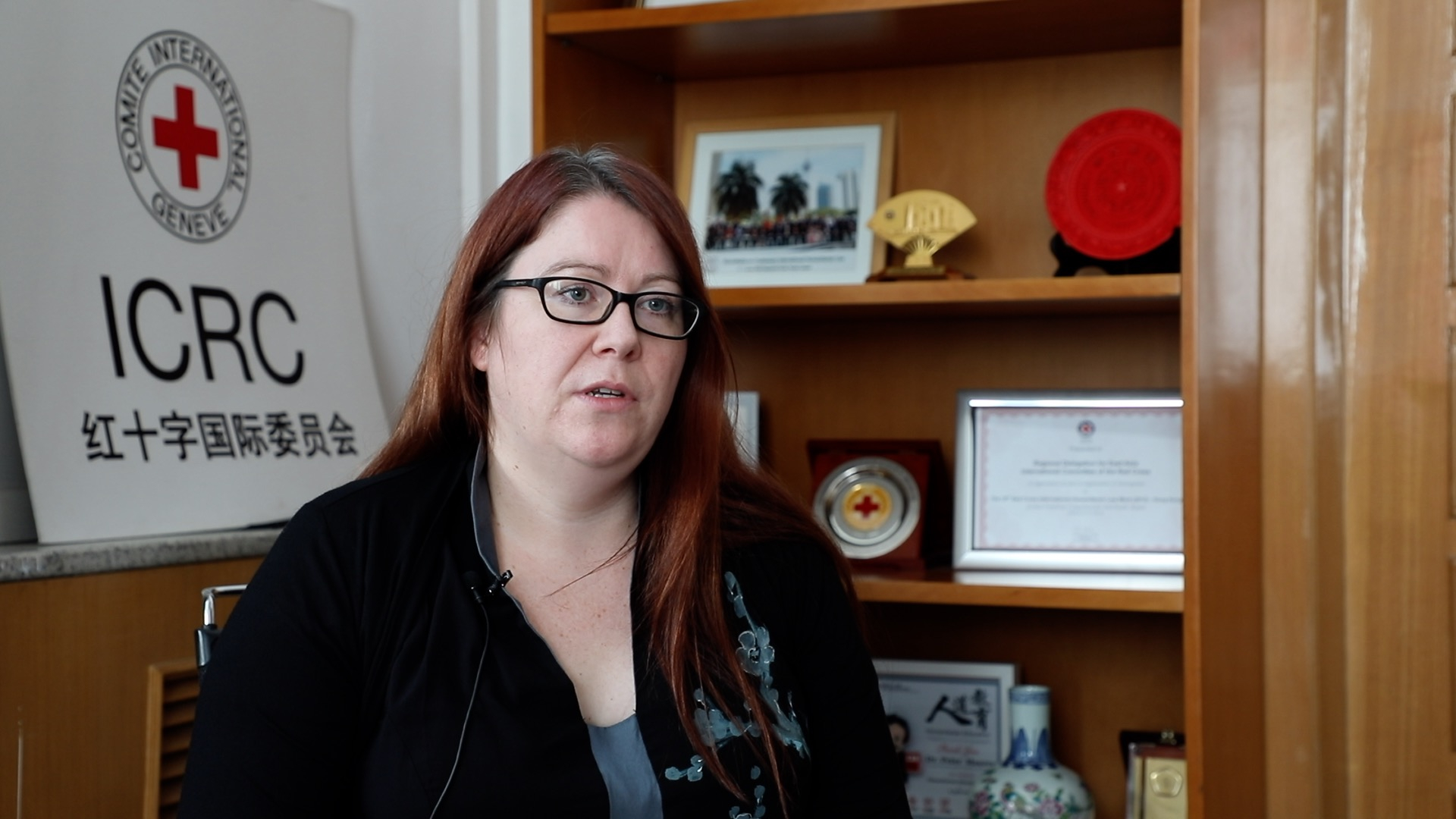
Cash transfers have become an increasingly important method of helping those displaced in armed conflict to fight against poverty and recover their livelihood.
From 2012 to 2017, the number of people assisted through cash transfer programming by the International Committee of the Red Cross (ICRC) has increased by 600 percent, according to a latest report issued by the international organization.
The report showed that in 2012, the organization used nearly six million US dollars worth of cash and vouchers to meet the needs of 190,000 people in some 20 countries. And by 2017, about 1.4 million people in more than 35 countries received cash transfer totaling about 63.4 million US dollars.
The remarkable growth shows that cash transfers are favored in conflict zones, primarily because having immediate access to cash in order to buy essential goods can mean the difference between life and death.
However, it is important to note that the cash transfers adopted by the ICRC do not merely give money or vouchers to people who need them.
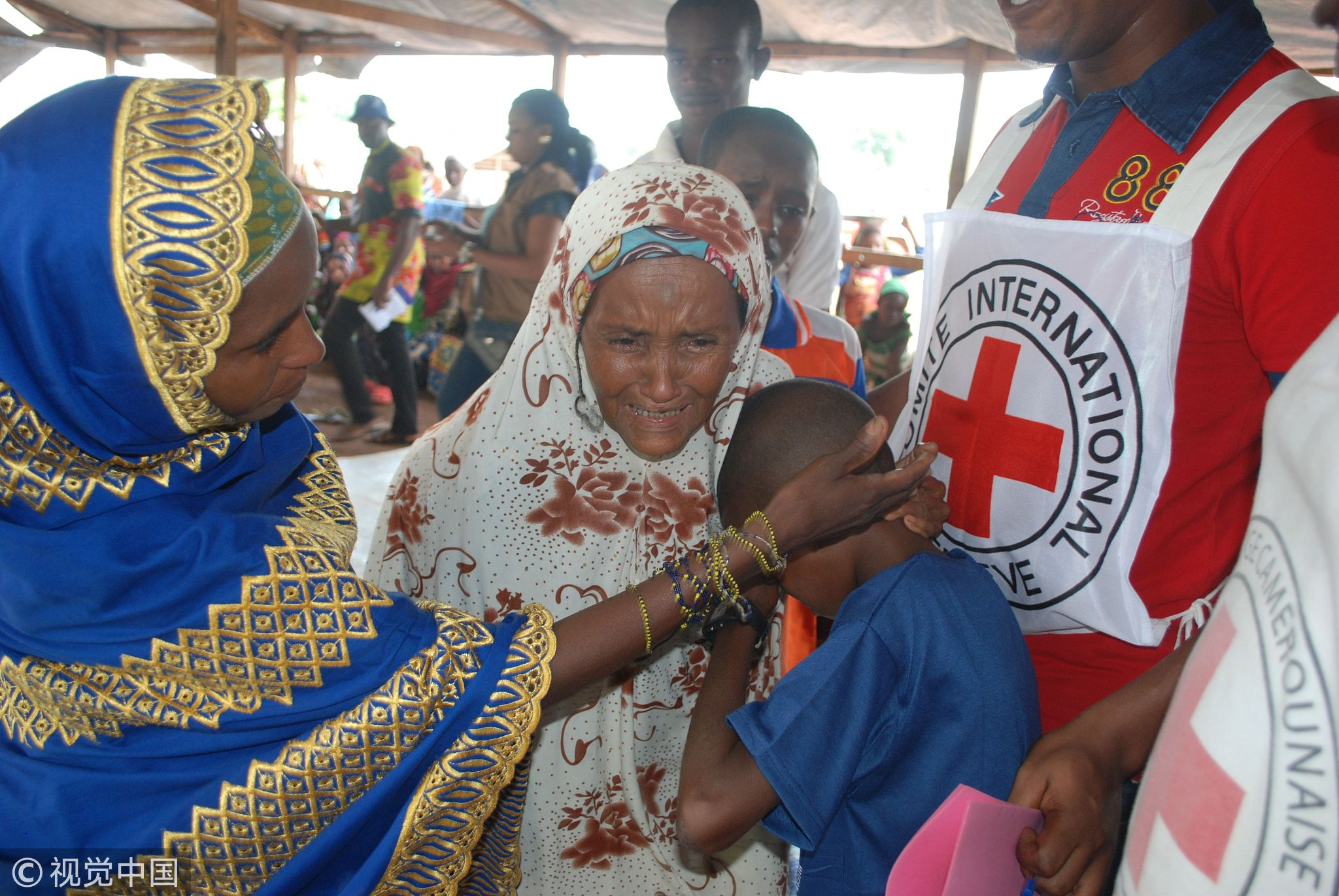
Yaouba Hamadou (C), a 13-year-old Central African Republic refugee, cries in the arms of relatives as he arrives in Lolo, east Cameroon, escorted by the ICRC, April 21, 2017. /VCG Photo
Yaouba Hamadou (C), a 13-year-old Central African Republic refugee, cries in the arms of relatives as he arrives in Lolo, east Cameroon, escorted by the ICRC, April 21, 2017. /VCG Photo
The cash transfer program advocates a needs-based analysis with the affected people, meaning the ICRC has to work out when and why some of the needy prefer direct cash assistance and others prefer other forms of support.
For example, in the areas where armed conflicts destroyed crops, shopping centers and food markets, giving the affected people money means giving them nothing.
But in other areas, where the markets persist, it is easy and efficient to give the poor money as a way of maintaining their basic needs and working towards recovery.
This needs-based relief undoubtedly brings the desired results and maintains the sustainable development of the cash transfer in the future.
"So for us, it's really important that we keep using cash when it's the best tool, so we will always continue in every country to assess the markets, to understand the needs of the effected population and understand what they prefer and wherever the cash is right tool, we will use it," said Jo Burton, Cash Transfers & Markets Specialist with the ICRC.
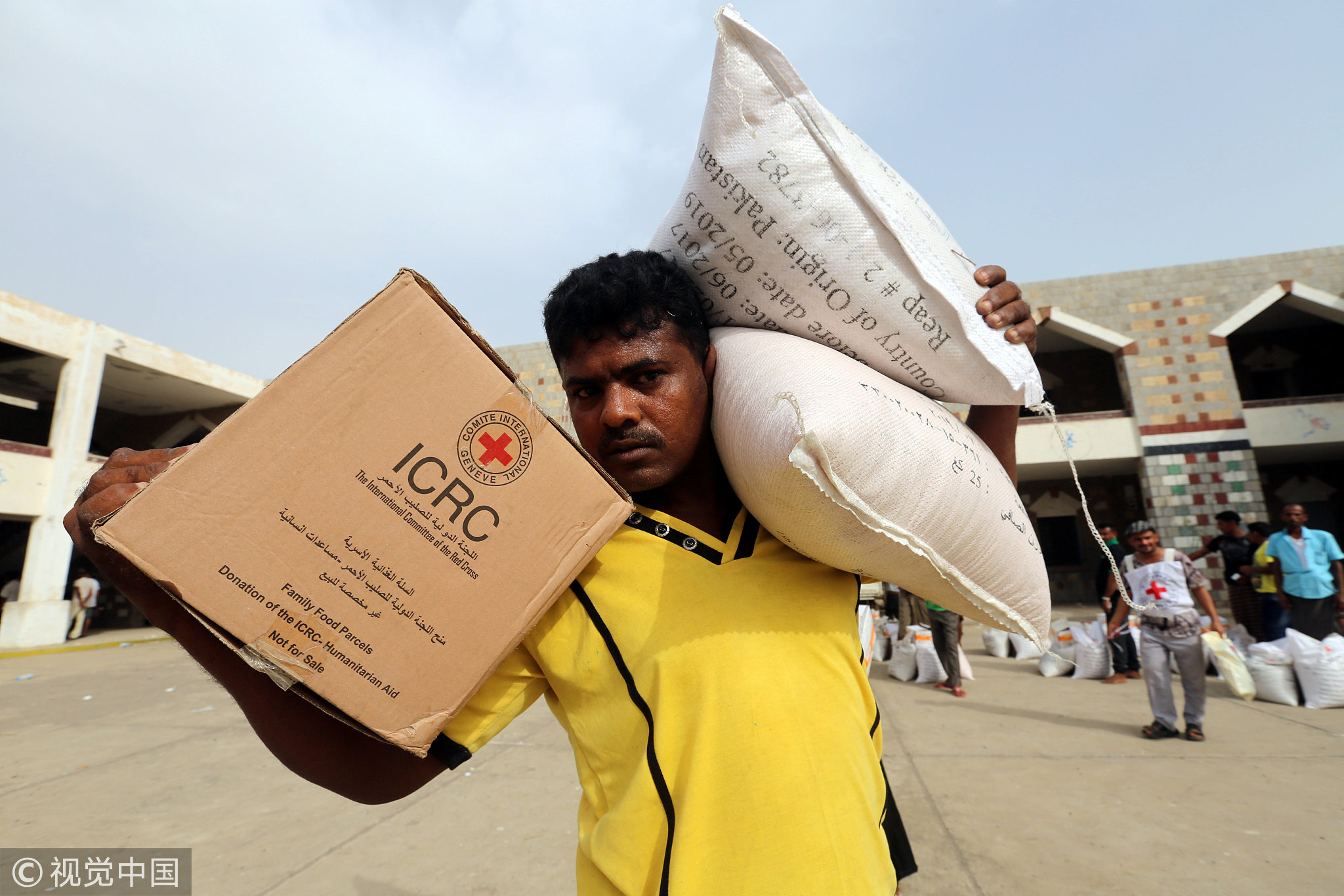
A displaced man receives aid kits distributed by the ICRC in the war-torn Red Sea port city of Hodeidah, June 21, 2018. /VCG Photo
A displaced man receives aid kits distributed by the ICRC in the war-torn Red Sea port city of Hodeidah, June 21, 2018. /VCG Photo
Jo is a veteran cash transfer specialist and spent nearly 12 years working in countries including Afghanistan and Ukraine.
She recalled the days when she worked with people along a front line in Ukraine.
"Most of the communities prefer to receive cash to help them meet their basic needs, and I walked into one village, there are 20 elderly people living in this village and all of their relatives and friends left, and for them, they said receiving cash was not their option, because they would not be able to go to the markets to spend the cash, they still prefer to receive food parcels, hygiene parcels and other items from the ICRC."
Experiences like this make her realize the importance of how money works.
"We can help people to invest in their livelihoods, to regain the assets they lost, so they can go back to working, to earn an income, so they can do that in a sustainable way, and they don't need to rely on our system for their basic needs. So for us, that's really important for people to recover from the crisis," Jo said.
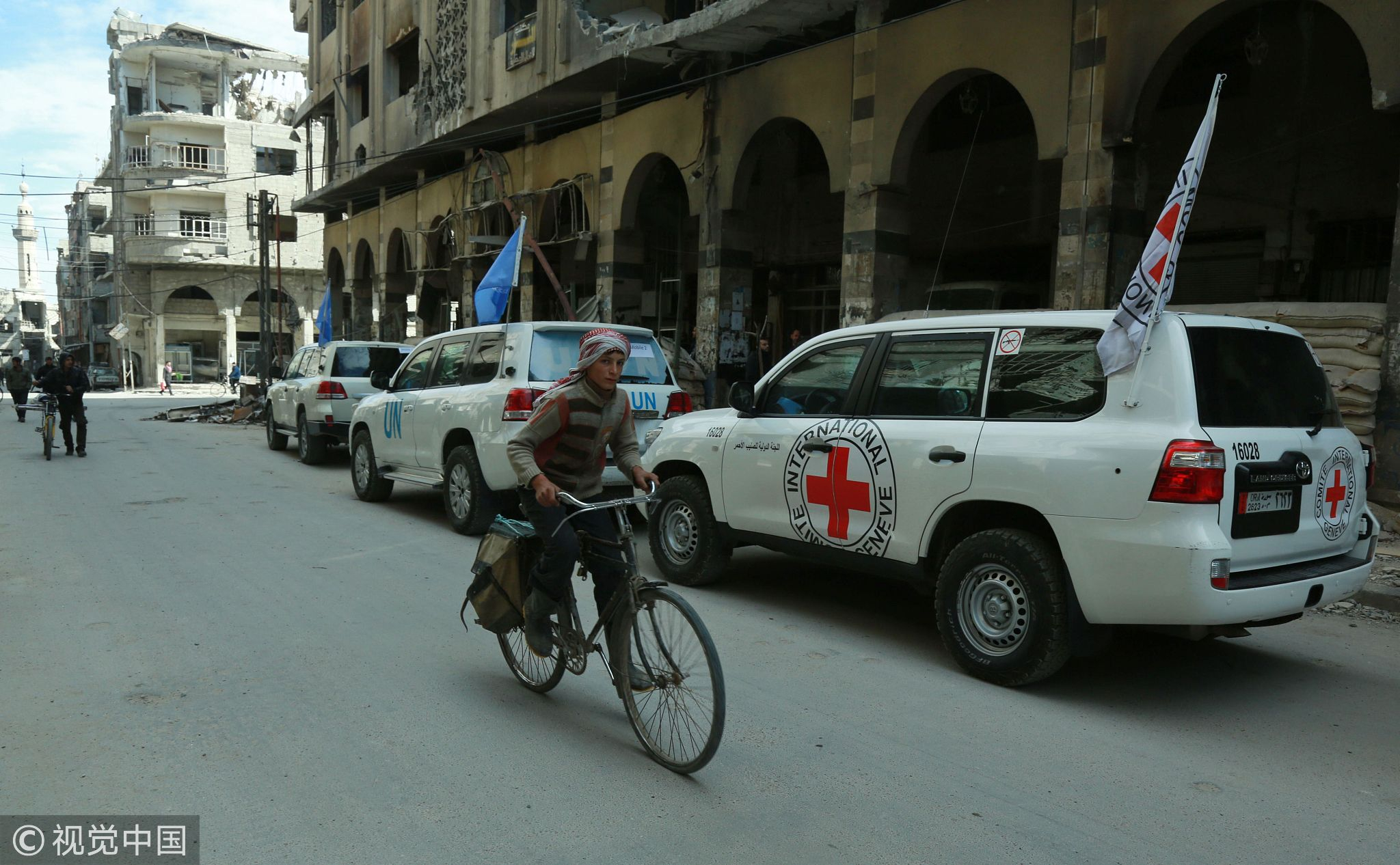
The vehicles of the ICRC deliver humanitarian aid in the Syrian town of Douma, March 9, 2018. /VCG Photo
The vehicles of the ICRC deliver humanitarian aid in the Syrian town of Douma, March 9, 2018. /VCG Photo
To pursue sustainable development and help more people recover from crisis and conflict, the ICRC cooperates with local organizations.
The ICRC has more than 12,000 staff in 80 countries around the world and about 30 percent of the organization's operational activities are carried out in cooperation with national societies.
In China, the ICRC carried out a livelihood project with the Red Cross Society of China in six provinces, including Yunnan and Guizhou.
For example, by investing in locals' businesses in Yunnan Province, the project not only helps locals increase their income, but also enhances their business skills.
"With the livelihood project, we want to help the locals develop abilities to enjoy a better livelihood rather than meet their basic livelihoods," said Sun Yan, head of EcoSec at the Regional Delegation for East Asia with the ICRC.
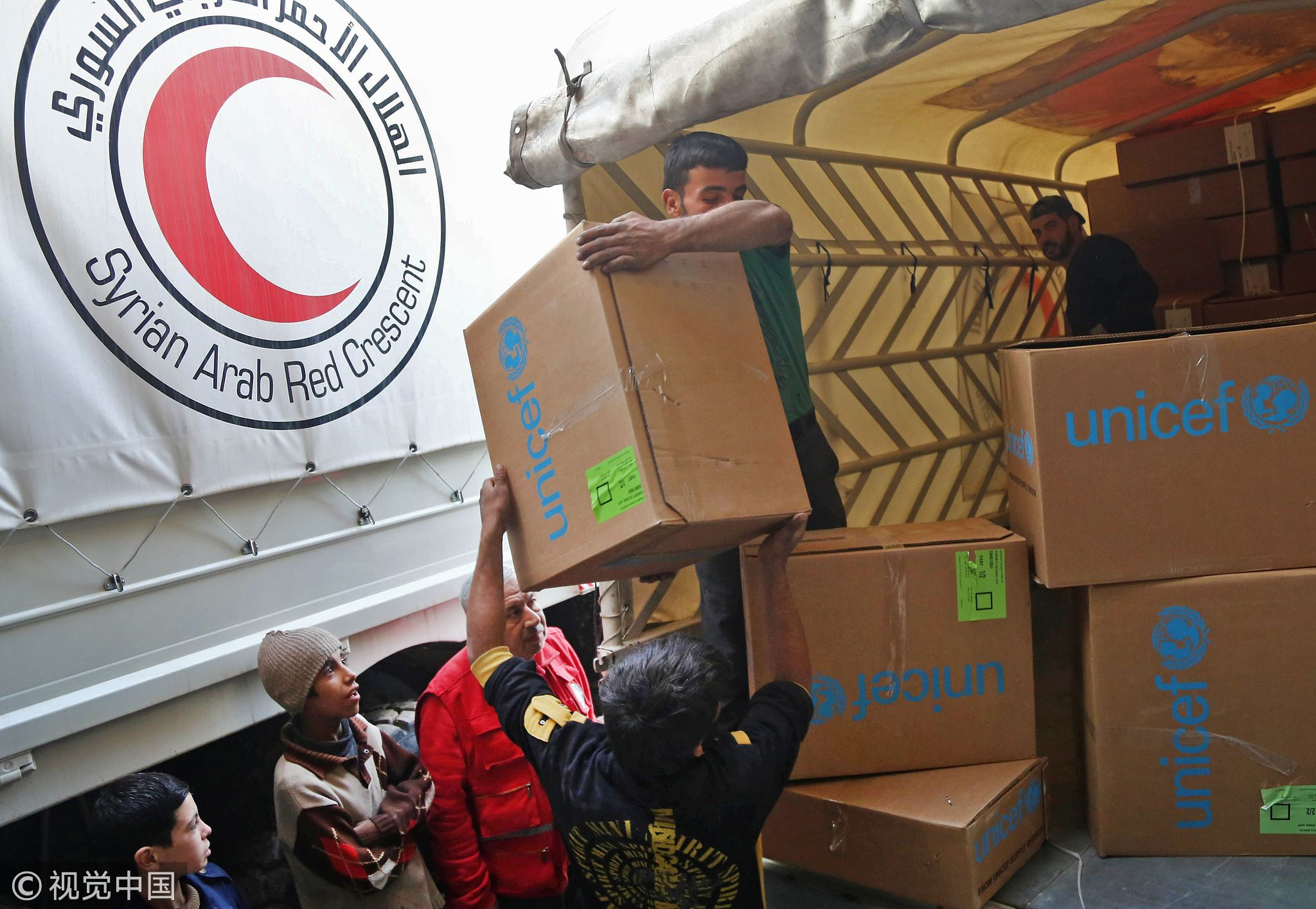
Aid packages provided by the ICRC in a joint operation with the United Nations, are unloaded in the al-Nashabia town, east of the capital Damascus, November 28, 2017. /VCG Photo
Aid packages provided by the ICRC in a joint operation with the United Nations, are unloaded in the al-Nashabia town, east of the capital Damascus, November 28, 2017. /VCG Photo
From Jo's point of view, China's technical advancement can help with the ICRC's money transfer program, which has witnessed more and more electronic cash transfers.
"I think China, in terms of technological advancements, is a world leader, and I think there are lots of opportunities for us to learn as a humanitarian sector as ICRC, from the private sector, looking at innovative ways of making payments and payment technologies. So I do think that there is a lot of space in innovation in cash transfer programming, not in money itself but in the way we deliver money to the people in a safer, faster and efficient way," said Jo.
Though Jo is confident about the ICRC's future, she also expressed concerns about the cash transfer program.
"One of the problems could be market interference. As I mentioned, when the goods are available in the market, you can give people cash. But if you put a lot of money into the economy very quickly, it could have impact on the inflation. And we need to be careful about that," she said.

SITEMAP
Copyright © 2018 CGTN. Beijing ICP prepared NO.16065310-3
Copyright © 2018 CGTN. Beijing ICP prepared NO.16065310-3